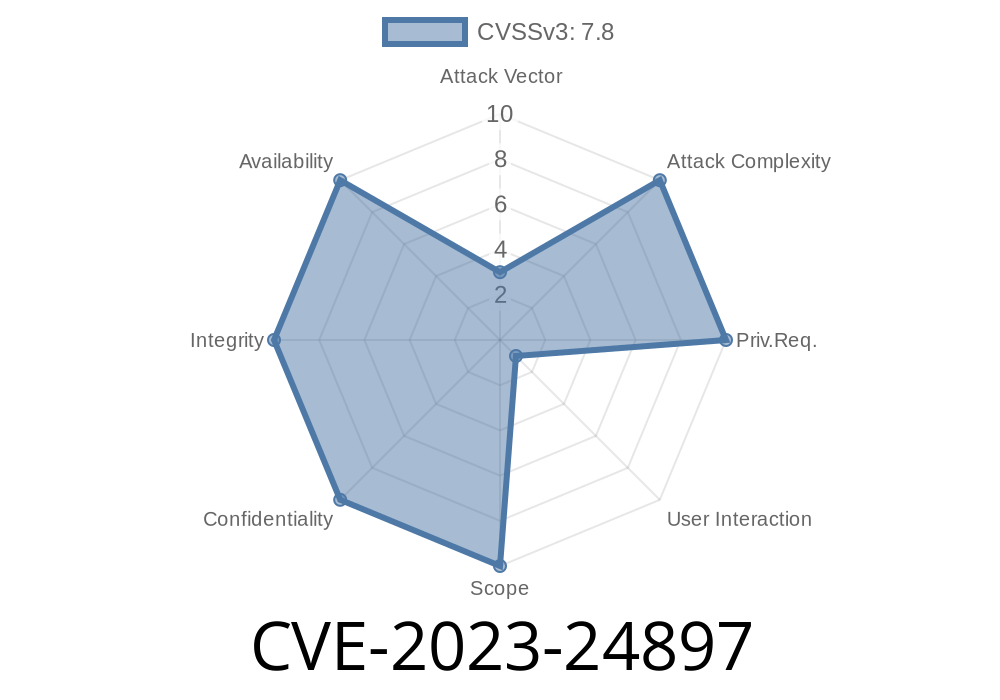In early 2023, Microsoft disclosed a critical vulnerability named CVE-2023-24897. This security flaw affects .NET, .NET Framework, and Visual Studio. If exploited, it allows remote code execution, meaning an attacker can run malicious code on your computer—potentially with the same permissions as the user running the application. This post breaks down what CVE-2023-24897 is, how it works, and what you can do to stay safe. We'll also show simple exploit details and real code snippets for a better understanding.
What Is CVE-2023-24897?
CVE-2023-24897 is a remote code execution (RCE) vulnerability in the System.Data.SqlClient and Microsoft.Data.SqlClient libraries which are used in .NET applications for interacting with SQL Server databases. The vulnerability affects certain versions of:
Visual Studio
An attacker can exploit the bug by tricking a vulnerable app to connect to a specially crafted malicious SQL Server, and then execute arbitrary code on the machine where the vulnerable client is running.
The Microsoft advisory is here:
https://msrc.microsoft.com/update-guide/vulnerability/CVE-2023-24897
Why Does It Happen?
The root cause lies in improper validation of TDS (Tabular Data Stream) responses when connecting to a SQL server. Under specific conditions, an attacker could send a maliciously crafted response that tricks the SqlClient library into running arbitrary code. Since many apps trust their database servers, this kind of attack is particularly dangerous for intranet or corporate environments.
Who’s Affected?
- Any .NET or .NET Framework application using the affected SqlClient libraries to connect to a SQL Server, especially when connecting to untrusted servers (or if the attacker can intercept and alter connections).
Exploit Scenario
Let’s imagine your .NET app connects to a SQL Server. If someone can make your app connect to their malicious SQL server (for example, by changing a connection string or intercepting traffic), they can send back a response that exploits this vulnerability. That lets their code run on your server, potentially taking full control.
Consider a vulnerable application like this
using System.Data.SqlClient;
class Program
{
static void Main()
{
// WARNING: Don't use unknown servers!
string connStr = "Server=malicious.example.com;Database=TestDB;User Id=sa;Password=pass;";
using (SqlConnection conn = new SqlConnection(connStr))
{
conn.Open(); // Vulnerable point
// Arbitrary malicious SQL Server can respond...
}
}
}
In this simple snippet, if an attacker controls the server (malicious.example.com), they could exploit CVE-2023-24897 during the conn.Open() phase.
How Could an Attacker Exploit It?
1. Set up a fake/malicious SQL Server that sends specially crafted responses during the connection handshake.
2. Trick a vulnerable .NET app into connecting to this server (e.g., via social engineering, stolen credentials, modified config).
Code of attacker’s choice is executed on the client machine—the one running the .NET app.
Example Packet Crafting:
While full exploit packets are complex, toolkits like Impacket can be modified to send malicious TDS packets for research.
Demo: Crafting a Simple PoC (Conceptual)
*Note: Do not use this for anything malicious. This is just to show the flow.*
# Conceptual pseudocode for a malicious TDS server; not a complete exploit
from socket import socket, AF_INET, SOCK_STREAM
server = socket(AF_INET, SOCK_STREAM)
server.bind(('...', 1433))
server.listen(1)
print('Waiting for .NET client...')
conn, addr = server.accept()
print('Connected by', addr)
# Send malicious TDS handshake (details redacted for safety)
malicious_packet = b'...' # crafted binary data here
conn.send(malicious_packet)
The .NET client above, if unpatched, could be vulnerable when connecting.
Microsoft Security Guide for CVE-2023-24897:
https://msrc.microsoft.com/update-guide/vulnerability/CVE-2023-24897
.NET Blog Advisory:
https://devblogs.microsoft.com/dotnet/net-march-2023-updates/#cve-2023-24897
How to Protect Yourself
1. Patch your systems.
The most effective defense is to install the latest patches from Microsoft, which fix this bug in all supported .NET/.NET Framework/Visual Studio versions.
2. Verify your dependencies.
Make sure you aren’t using old SqlClient packages that could be vulnerable. Update System.Data.SqlClient and Microsoft.Data.SqlClient to the latest versions.
3. Don’t connect to untrusted SQL Servers.
Never connect production apps to unknown or untrusted SQL servers, even for testing.
4. Use network security.
Use firewalls/VPNs to control which network resources are accessible, limiting exposure of internal apps.
Conclusion
CVE-2023-24897 is a serious vulnerability affecting how .NET apps connect to SQL Servers. It’s easy to overlook—just one misconfigured connection string or overlooked dependency could put your network at risk.
Patch now, and double-check every app’s external connections!
Further Reading:
- Microsoft .NET Security Updates
- Understanding Remote Code Execution
Stay safe! If you have legacy .NET code, check your dependencies and patch today.
Timeline
Published on: 06/14/2023 15:15:00 UTC
Last modified on: 06/14/2023 15:30:00 UTC
